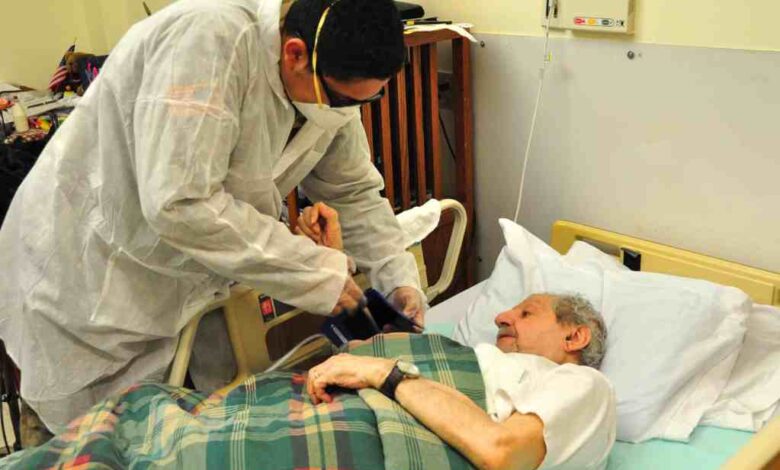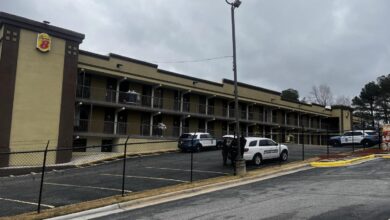‘Disheartening’ auditor report reflects experiences filing complaints about nursing homes


By Grace Vitaglione
Alice Hedt said she saw “horrible conditions” in a Piedmont-area nursing home while visiting a resident there in fall 2024. Her friend, who was in the facility for rehabilitation, needed assistance to get up and use the bathroom, among other activities.
But when she pressed the call bell for help, it often went unanswered for half an hour to an hour. The call bell was also impossible for her to reach; Hedt moved it so she could reach it.
Her bathroom floor was streaked with dirt and the sink was grimy; it looked like they hadn’t been scrubbed for a long time, she said. There were dirty tissues, bits of food and paper scraps on the floor around her bed. The bed itself had crumbs and the shelves in the room had a film of dust.
When Hedt went to the nursing station to ask for help, staff told her they first had to feed the people lined up in their wheelchairs against the wall before responding to call bells.
Eventually, Hedt said her friend did fall because no one came to help her. She ended up re-injuring herself.
“It broke my heart because she had said to me, ‘If they don’t start helping me to the bathroom, I’m a fall risk,’” Hedt said.
Hedt filed a complaint with the state in September 2024, figuring it would be two weeks at most before the state could send an investigator to the facility. But as of Feb. 21, state officials still have not visited.
Hedt is in a unique position to know what a problem this is. The Orange County resident was the state ombudsman of Maryland from 2010 to 2015, a position where she had the responsibility of resolving complaints and concerns for nursing homes across the state. She was previously one of North Carolina’s first long-term care ombudsmen, a job where she acted as an advocate for residents. She’s deeply familiar with the long-term care industry.
“I keep thinking: If what I would consider a serious level of complaint has not been addressed, how much of this serious stuff is going on?” she said. And it made her wonder how many residents are suffering in that nursing home and throughout the state.
Hedt’s experience reflects the reality laid out in a December 2024 performance audit of the state’s oversight of nursing homes conducted by the North Carolina Office of the State Auditor.
The audit determined the state had not completed timely inspections of nursing homes nor done adequate follow-ups to complaints. The N.C. Department of Health and Human Services pointed to a lack of resources and inadequate staff hampering their ability to keep up with complaints.
Other states are also struggling; a 2023 U.S. Senate report said nearly a third of the nation’s nursing homes are behind on annual inspections.
‘Money down the drain’
Hedt’s friend is now in a different facility that has enough staff to provide care, she said. But taxpayer money, such as the federal health insurance programs Medicare and Medicaid, shouldn’t be used to reimburse facilities where people aren’t taken care of, she said. It’s “money down the drain.”
And, more importantly, people in a nursing home have a right to basic care and dignity at a minimum, she said.
“As taxpayers, our dollars should be used to provide basic care — feeding and helping people to the bathroom and tending to them is about as basic as it gets,” she said.
North Carolina had 419 certified nursing facilities with over 34,000 residents in 2024, according to KFF, an organization that provides health policy research, polling and journalism. Medicaid was the primary payer for 61 percent of those residents and Medicare 14 percent.
Medicare doesn’t generally cover long-term services — the program may only cover up to 100 days of care in a skilled nursing facility under certain conditions. An individual could then spend the rest of their savings and assets until their income is low enough for them to qualify for Medicaid to cover their nursing home care.
Nursing homes participating in the Centers for Medicare and Medicaid Services program — nearly every nursing home in North Carolina — must follow certain federal regulations. Those regulations are enforced by state surveyors in the Division of Health Service Regulation of NC DHHS.
State surveyors are supposed to conduct an inspection of each nursing home at least every 15 months, on top of investigating complaints. Those complaints are prioritized based on severity.
If the alleged violation has caused or is likely to cause serious injury, harm, impairment or death to a resident, state surveyors are supposed to investigate within three business days, according to DHHS’ response to the audit. If the alleged violation may have caused physical and/or psychosocial harm to a resident, they must investigate within 15 days. Otherwise the state can investigate within 45 days or at the time of the next annual inspection.
If state surveyors find that the nursing home is violating a regulation, CMS can impose penalties on the facility. Surveyors must follow up and verify that those deficiencies were corrected.
Auditor report
The North Carolina Office of the State Auditor determined that inspections for 68 percent of nursing homes were late in the period from March 1, 2021 to Dec. 31, 2023 — meaning they weren’t completed within 15 months of the last inspection. Ten percent were not inspected for more than 20 months.
When the Division of Health Service Regulation did complete a late inspection in one nursing home, surveyors found “immediate jeopardy” due to abuse and neglect, as well as failure to treat bed sores (also called pressure ulcers) on residents. For instance, a resident had an open wound on her foot after a staff member did not stop pushing her wheelchair even after she said her foot was stuck under it.
Auditors also recommended that the state make the timing of their inspections more unpredictable — 73 percent of inspections began on a Monday.
The auditors also determined the state wasn’t investigating complaints quickly enough. Between January 2019 and December 2023, the division received more than 17,000 complaints that required investigation — 39 percent of those were completed late.
However, the auditor’s office was measuring investigation timeliness according to state law, which says all complaints must be investigated within 60 days. The division said they’ve never had enough resources to comply with that law and instead stick to the federal timelines, which are more lenient in some cases.
State regulators are supposed to follow up on nursing homes that violated regulations to make sure they actually corrected those issues. But the auditors determined the state didn’t verify the correction of 37 percent of deficiencies in the sample.
Responses from DHHS
In response to the state auditor’s report, DHHS pointed out that the audit’s timeframe included the COVID-19 pandemic, which required a shift in the regulators’ focus and responsibilities. The federal government suspended routine inspections and less serious complaint investigations during this time, while staff from the Division of Health Service Regulation were busy conducting infection control visits.
That led to a backlog in complaints, and neither the state nor federal inspectors expected to be able to work through the backlog right away, DHHS said.
The auditor’s office responded that the report excluded inspections prior to March 1, 2021, and investigations made from March 4, 2020, to March 1, 2021, in timeliness calculations for this reason.
The Division of Health Service Regulation has faced a 51 percent increase in complaints over the past eight years, and those complaints also increased in severity, according to DHHS’ response to the audit.
The department requested additional staff, higher salaries and improved benefits for the team in each of former Gov. Roy Cooper’s last four recommended budgets, but the N.C. General Assembly only provided partial funding for higher salaries and more competitive benefits in some budgets.
The General Assembly also hasn’t added any inspector positions since 2021, according to reporting from Carolina Public Press.
DHHS also pointed out that the CMS evaluates states’ oversight performance and concluded the North Carolina team exceeded performance standards from Oct. 1, 2021, through Dec. 22, 2023.
Adam Sholar, president of the N.C. Health Care Facilities Association, an advocacy group for skilled nursing facilities, commented over email that nursing homes operate with a “survey-ready” mindset and fully cooperate with state officials.
“These reviews are important for accountability, and our facilities provide inspectors with access to anything they need,” Sholar said.
‘A total overhaul’
The Division of Health Service Regulation had 97 nursing home surveyor positions in 2023 and 2024. The turnover rate was about 20 percent in 2023 and 24 percent in 2024, according to DHHS.
Cindy Deporter was the state agency director at DHSR until retiring in May 2021 and is currently a board member of the resident advocacy nonprofit Friends of Residents in Long Term Care. She said surveyors’ jobs involve long hours, hard work and extensive travel, often outside normal working hours.
The hiring process is slow, and it also takes several months to train a new surveyor, she said.The teams are mostly made up of registered nurses but also include social workers, licensed practical nurses and dieticians, according to DHHS. The average salary across these positions in 2023 was about $70,000 and over $73,000 in 2024.
Pharmacy consultants are also part of the team and received an average salary of almost $113,000 in 2023 and over $117,000 in 2024.
Deporter said employees’ relationships with management are crucial. Job satisfaction and whether someone feels appreciated by management is a factor in retaining staff — the nursing home licensure section has historically had a high vacancy rate, she said.
Salary alone isn’t the only solution. If the department can’t fill the vacant positions it already has, just asking for more money won’t solve the problem, Deporter said.
“You have to do a total overhaul of what’s going on,” she said.
Friends of Residents in Long Term Care has advocated for more inspector positions and more ombudsmen, said executive director Kay Castillo.
Castillo said the backlog of inspections likely compounds inspectors’ workload, as small problems can snowball.
“Some of the stuff that they had to write up and see, I imagine that is a hard thing to witness without having the proper training and support,” she said.
Making concerns heard
Castillo said the audit was “disheartening,” but she wasn’t too surprised. The numbers were in line with the conversations she’s had with families and residents about their experiences filing complaints.
It’s telling that even someone familiar with the long-term care system like Hedt still struggled with getting their concerns answered, Castillo said. Many residents and family members go to Friends of Residents for help after filing complaints with the state and/or facility without results.
“They’re frustrated. They thought they did the action that they needed. Nothing has happened. It remains the same. And they just don’t know what to do next,” she said.
Many are also afraid of complaining because they worry the facility will retaliate on the resident and make things worse, she said.
Others feel they can’t wait until the complaint is investigated and need to get better care for the resident right away, so they take the resident out of the facility. But after that, they no longer pursue action on the complaint, she said.
Sholar said that nursing homes have formal grievance policies, and many have a complaint hotline and Residents Council where residents can share concerns.
National issue
The U.S. Office of Inspector General published a report in 2022 stating that the Centers for Medicare and Medicaid Services needs to do a better job addressing states who poorly perform in surveying nursing homes. Just over half of states repeatedly failed to meet one or more performance measures—most commonly, timeliness requirements— for conducting surveys from 2015 to 2018, the report said.
CMS usually required those states to submit plans for how they would improve, but those plans didn’t always have substantive details — and 10 percent were missing from the federal regulator’s files, according to the report.
State surveyors also sometimes understate the extent of serious care problems in nursing homes because they miss deficiencies, according to a 2008 Government Accountability Office report. The report determined surveyors missed deficiencies at the lowest level of noncompliance — the potential for more than minimal harm — in 70 percent of state surveys nationwide from 2002 to 2007.
Those less serious deficiencies can develop into more severe issues. The most frequently missed deficiency of this type was poor quality of care, such as ensuring proper nutrition and hydration and preventing bed sores, the report said.
North Carolina missed at least one serious deficiency in 14 percent of surveys and at least one deficiency with potential for “more than minimal harm” in 81 percent of surveys in 2007.
Looking ahead
Castillo said this issue will become even more serious as North Carolina’s aging population grows. The population of people ages 65 and older in North Carolina is projected to reach almost 2.7 million by 2041, according to data from the state demographer.
Many of them will need long-term care, but the time to improve the system is now, Castillo said.
“I think what’s important is for people to understand that we can’t wait to figure it out,” she said. “We can’t put people’s lives in jeopardy while we talk about minimum staffing, or talk about how much money we need, or talk about X, Y or Z. We’ve got people that are waiting and have been promised quality care.”
KEEP UP WITH THE LATEST
The post ‘Disheartening’ auditor report reflects experiences filing complaints about nursing homes appeared first on North Carolina Health News.










